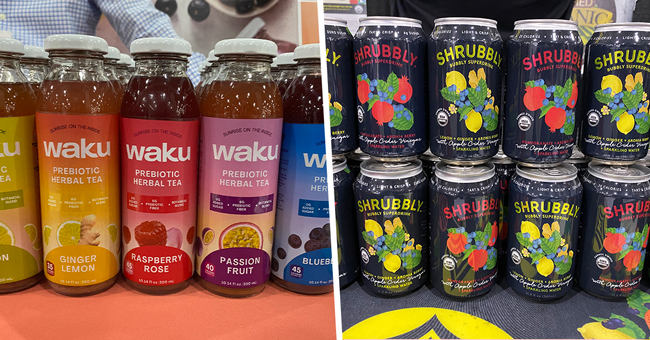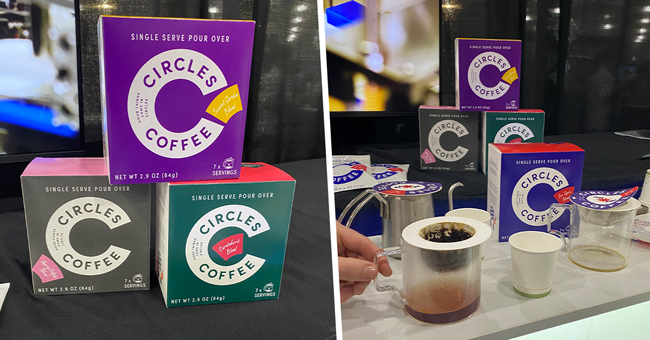Mocktail Brands Keep Moving Forward
With alcohol alternatives on the rise, canned mocktail makers are staying focused on growing distribution and introducing new options for consumers seeking out non-alcoholic solutions.
Laura Taylor, CEO of Mingle Mocktails, said the company is preparing to enter two major retailers – one liquor chain and one grocery chain – and the brand has expanded its footprint to about 5,000 stores nationwide, including Whole Foods and Wegmans. Taylor said she hopes to also grow foodservice and hospitality accounts in the next two years as more bars and restaurants expand non-alcoholic beverage menus.
Taylor said more retailers are beginning to build out non-alc sets in store, including some Whole Foods stores, Erewhon and Town & Country. In retail, Mingle’s single-serve cans have outpaced sales of its multiserve bottles, she noted, and the company has expanded its sales, marketing, supply chain and operations teams to support its growth. Taylor has also advocated for retailers to establish sets in order to support the category and drive growth, and has worked with buyers such as Town & Country’s Dwight Richmond in creating alcohol alternative shelves.
“Something that I will be working on as I engage with retailers and buyers and distributors is ‘What does the data say?’” Taylor told BevNET. “Dwight proved out that when you create a non-all set people will purchase more because they know where to find it and they see all that’s available. Whereas retailers who put a non-alc beer one place and a non-alc cocktail in the mixer set, they’re not going to enjoy the turns because people don’t know where to find it.”
At the show, Mingle introduced its latest flavor: Key Lime Margarita. The canned mocktail will roll out to stores next month.
“As somebody who quit drinking, I don’t want to have that flavor of alcohol again,” Taylor said. “Mingle fits that need for layered flavors that are fruit-forward but give you that adult experience. So there is a place for that as well as a non-alc spirit alternative as well as a non-alc beer experience. So I think in this non-alc cocktail space you see the most innovation because there’s the most opportunity for flexibility.”
Elsewhere on the show floor was Washington, D.C.-based startup Mocktail Club, which has tailored its portfolio around original non-alc creations that have the complexity of an adult beverage. Varieties include Manhattan Berry (blackberries, pear shrub, ginger), Havana Twist (lime, cucumber, mint, cardamom), Capri Spritz (pomegranate, cranberry shrub, lemongrass and hints of bitter) and Bombay Fire (pomegranate, chili, agave and infused tea). Each 12 oz. can retails for $3.99 to $4.50.
According to founder and CEO Pauline Idogho, Mocktail Club is available in Erewhon and Whole Foods and will be launching with Town & Country in the near future. The brand is also available direct-to-consumer and through Amazon.
Small Companies Showcase Rebrands
Several startup beverage makers debuted rebrands at the show as they aim to build momentum and re-establish themselves in retail after a difficult past two years.
Vermont-based Shrubbly introduced a new look for its cans earlier this year ahead of a West Coast expansion in Erewhon stores. Founded in 2020 by Matt Sayre, Shrubbly is an organic “Bubbly Superdrink” made with shrubs, apple cider vinegar and sparkling water. The drinks are available in Lemon + Ginger + Aronia Berry and Pomegranate + Aronia Berry flavors and each 12 oz. can retails for $2.99. According to Sayre, two more flavors are scheduled to launch next month and the drinks are made with locally grown aronia berry from Sayre’s Vermont farm.
Despite a pandemic slowdown, Sayre said Shrubbly has built “strong distribution” in New England with placement in about 150 stores across co-ops, specialty and independent accounts, as well as Hannafords supermarkets and MOM’s Organic Market along the East Coast, Sayre said the rebrand will help establish Shrubbly as a “category defining brand for sparkling shrubs” by clarifying its healthy ingredients and benefits.
Another New England brand, Massachusetts-based tea Waku, also showcased its rebrand and reformulated product line which was released in April. Now positioned as a prebiotic herbal tea, co-founder and CEO Juan Giraldo said the brand has removed the sugar from its product and moved to natural sweeteners (stevia and monk fruit). As well, the company added 6 grams of prebiotic fiber to its drinks in order to better position Waku as a functional gut health product.
“All of our products are based on a traditional recipe from the South of Ecuador,” Giraldo said. “We grew up drinking that stuff in Ecuador because of the great taste and natural gut health benefits. We kept the same base in the product, but now we’ve added the prebiotic fiber and it keeps being super natural – we use only real fruit juices, only real herbs. Nothing from concentrate, so that’s the main thing that summarizes what our brand is and we kept all the good things.”
Giraldo said the brand has been primarily focused on direct-to-consumer and Amazon sales but is now looking to expand in the natural channel. The company has six full time employees and plans to open a funding round in the near future to begin scaling.
Finally, New York-based tea concentrate producer Dona Chai announced the relaunch of its “Spice Soda” line Ouli. The rebranded drinks are available in Pink Peppercorn Lemon, Juniper Lime and Turmeric Honeybush flavors and the colorful new labeling is intended to help differentiate the line from the parent company.
Circles Coffee Introduces Single-Serve Pour Over
As new ground coffee formats like steeped bags and innovations for traditional instant coffee have expanded their footprint over the past several years, California-based Circles Coffee is now looking to provide caffeine aficionados with a convenient way to make pour over coffee on the go.
Founded by former data manager Charles Kim, Circles produces a line of compostable, single-serve pour over coffee packets. The products feature ground coffee in paper packaging that are designed to be placed on top of a mug; consumers then pour hot water over the grounds.
According to Kim, who has primarily bootstrapped the company to date, Circles has built its own proprietary manufacturing system in order to create the packaging. While some coffee makers, such as Copper Cow, have introduced single-serve pour over formats previously, Kim said his approach is designed to be completely compostable. The company raised around $11,000 from a Kickstarter campaign this past winter and, after more than two years of R&D, Circles launched last year at the Specialty Coffee Expo.
The brand’s original Sun Cycle Blend is available online direct-to-consumer and Amazon, and in select retail accounts including Berkeley Bowl. Kim said the company is also preparing to launch in Army Exchange stores and hopes to also begin producing private label products for larger coffee roasters.
Each 7-pack box of Circles retails for about $15, but Kim said he hopes to lower the price point and plans to introduce smaller pack sizes priced around $8.99 to $9.99 to help drive trial. The brand is also launching three new SKUs, including Dark Roast, Blonde Roast and a Decaf.


